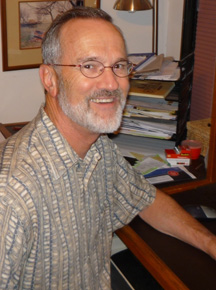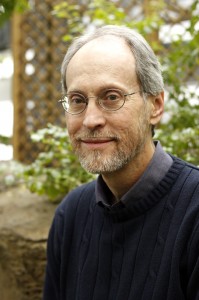 One morning about a decade ago, I sat down to recreate a summer day in my adolescence when my brothers and I built a fire to burn the body of a dead cow. Memory, creative energy, and whatever skill I could muster came together, and when I handed the resulting poem to my partner Scott Wiggerman, I felt that I had something. Scott lopped off the first dozen lines, called them a running start, and told me the poem started with line thirteen. I didn’t want to hear this. I was invested in the lines he suggested cutting; I wanted to keep them.
One morning about a decade ago, I sat down to recreate a summer day in my adolescence when my brothers and I built a fire to burn the body of a dead cow. Memory, creative energy, and whatever skill I could muster came together, and when I handed the resulting poem to my partner Scott Wiggerman, I felt that I had something. Scott lopped off the first dozen lines, called them a running start, and told me the poem started with line thirteen. I didn’t want to hear this. I was invested in the lines he suggested cutting; I wanted to keep them.
Luckily, though, I had learned to listen, even when I’d rather not. As I read and re-read my draft, I saw a kind of expository tedium in the lines Scott thought I could do without:
The Red Cow lay down beneath a tree
one summer day at noon and couldn’t get
back up again. Boys will be boys: we poked
at her with sticks. But her legs had quit.
For the hours left to her she would not move
from the dusty shade beneath this tree.
She didn’t try to, didn’t flinch . . .
By contrast, I could hear strength and confidence and momentum in the lines Scott said should open the poem:
Even our names for the cows who gave us
calves for sale and slaughter, who gave us milk
and cream and butter, who quit mooing soon enough
when we weaned their calves away from them—
even our names for them were blunt
and uninspired, unmarked by attachments
of the heart. The Red Cow, the Little Cow,
Brindle. We called one of them the New Cow
for fifteen years. And by the summer the Red Cow
lay down beneath the tree at noon and failed
to get back up again to graze among the others,
she was very old . . .
Scott was right: these lines know where they’re going. I cut the first dozen lines and went to work on the rest. The poem’s closing had a bothersome hint of sentimentality; I mused over that until I came to an image that closed the poem more effectively. I gave the poem a title: “Fire at Midsummer.”
Laurie Kutchins, a remarkable poet and my workshop director at the 2003 Taos Summer Writers’ Conference, looked over a packet of my work, singled out the cow poem, and suggested I send it to The Southern Review. I spent weeks selecting and refining four additional poems to go with “Fire at Midsummer” and sent the batch off. The Southern Review took the cow poem. It was published in the summer 2004 issue.
I tell this story here because I know that trusted others are essential to the continuing development of the editor’s eye, that the editor’s eye is as important to a writer as whatever propels each of us to put words on paper to begin with. I have called out Scott by name. Let me mention others: Debra Monroe, Twister Marquiss, Kirk Wilson, Stacy Muszynski, Gary Cooke. Debra was my professor and thesis advisor. Twister is a friend who shares my passion for well-crafted fiction. Kirk, Stacy, and Gary are members of a writing group that has perfect editorial chemistry.
Before I go any further, let me say a few words about trust. I have named the writers named above because their vision of poetry and fiction, as well as their skills as editors, intersect nicely with mine—also because without fail each is the kind of person who can be honest and decent, blunt and positive, all in the same breath. I need that. I think we all do. Cheerleaders are useless to the development of a writer’s skill, as are naysayers. About the former: we learn nothing from unadulterated praise. Personally I don’t trust it. I suspect a cheerleader editor of being insincere, of not doing the hard work of reading like an editor. As for hatchet carriers: do not show them even a line of your writing. The human psyche shuts down under meanness, even disguised as “helpful” criticism.
But what can I learn from trusted others? What can they do for my writing that I can’t do for myself?
My answer is twofold:
1. They help me get out of my own head. They help me see what hypothetical future readers might bring to the page. I confess that I want to see my stories published. I want them read. I want them praised. My trusted others help me see how that might be possible.
2. They refine my internal editor’s eye—so that when I draft a new story, when I plunge into revision, I bring new energy, new skill, new perspective to the process. This takes commitment, of course, but if I pay attention, if I think about what my trusted readers say to me I am rewarded with the invaluable prize of editorial distance from my own words.
I rely on trusted others to know me as a writer, to show me where a poem or story might go, to help me rein in a tendency to wordiness that I will carry with me to my grave. About the word might. Don’t show your work to others unless you have a strong sense of yourself as a writer, a confident vision of whatever you put before them, an understanding that you will weigh the editorial suggestions put before you, that you will decide whether a might becomes a must be.
When Debra Monroe reads one of my stories, for example, she is likely to mark it as would a line editor, placing brackets around words and phrases that might be left out. Debra knows me. She knows that I want to try out the available possibilities for conciseness. She knows I’m not going to chop everything she brackets—because the result would be a stilted mess, reading not like my work or hers but like butchery. That said, recently Debra read a 1900-word story that was near final form. By closely examining her line edits, I was able to shorten the story by 200 words—and improve its momentum, its tension, its music if you will.
Debra is also one of my best readers for hidden potential. Last year, I handed her a story I’d revised several times over several years, each time with the nagging feeling that something was missing. “Agua Dulce” was a very short piece, focusing on a young girl’s first sexual experience in a dry creek bed in South Texas. Other readers had taken the story’s time frame as a given—opening with the protagonist on a bridge in the moonlight, watching the approaching headlights on her boyfriend’s car, and closing the next morning, when she steps out of the creek bed and onto the road by the bridge where the story began. Debra said no, this story isn’t finished. She asked what if the protagonist arrives back at the bridge just as her school bus drives by? What if the bus stops and kids on the bus taunt her? What if, when she arrives home, her boyfriend is there, trying to soften the impact of her overnight absence? These questions lit a fire under me. I wrote both scenes and sent the story out. It won the 2012 Talking Writing Prize for Short Fiction.
This work with trusted others is like dancing. Sometimes it goes smoothly, and sometimes feet get stepped on. A recent story went first to Scott, who suggested only minor edits, then to Kirk, Stacy, and Gary, who identified flaws in characterization, as well as a key plot turn that simply wasn’t credible with them. I revised and sent the story to Debra, who suggested a scene in which the protagonist acts on his attraction to one of the other characters. I wrote that episode, but the explicit sex struck me as cheesy. I handed it to Scott again, and he agreed with me. I’ve since written a near-final version that leaves out the sex but makes the attraction more palpable than in earlier versions. If time allows, the story will go to Twister, who has an amazing ear for repetition, for helping me to hear felicitous—and jarring—echoes in my work.
I have a great deal of fun with this process. Odd word here, fun. But I love revision. I love stories. I love the dance that leads to a good one—the give and take between writer and trusted editors, between the energy that leads me to the page and the inner eye that looks back over it and says you can do better. And the process is reciprocal. Scott and I, Debra and I, Twister and I exchange work. Kirk, Stacy, Gary and I take turns submitting stories. As they read me and I read them, we become better readers of each other’s work and better writers of our own. As Debra said recently, quoting Malebranche, “We are not our own light.”
When you find trusted others for your writing, cultivate them. Editorial relationships have worked out very well for me. Take Scott Wiggerman, the poet who reads my work and asks me to read his. I married him last week. We didn’t write editing into our vows, but I think it was implied.
Editor’s note: David’s story, In the Garden, appears in s[r] Issue 7:
David also served as co-editor of Wingbeats: Exercises and Practice in Poetry, an August 2011 release from Dos Gatos Press.
 A former U.S. Foreign Service officer, Mark Jacobs has published more than 100 stories in magazines including The Atlantic, The Southern Humanities Review, The Idaho Review, The Southern Review, and The Kenyon Review. He has stories forthcoming in several magazines including Playboy. His story “How Birds Communicate” won The Iowa Review fiction prize. His books include A Handful of Kings, published by Simon and Shuster, and Stone Cowboy, by Soho Press, which won the Maria Thomas Award.
A former U.S. Foreign Service officer, Mark Jacobs has published more than 100 stories in magazines including The Atlantic, The Southern Humanities Review, The Idaho Review, The Southern Review, and The Kenyon Review. He has stories forthcoming in several magazines including Playboy. His story “How Birds Communicate” won The Iowa Review fiction prize. His books include A Handful of Kings, published by Simon and Shuster, and Stone Cowboy, by Soho Press, which won the Maria Thomas Award.

